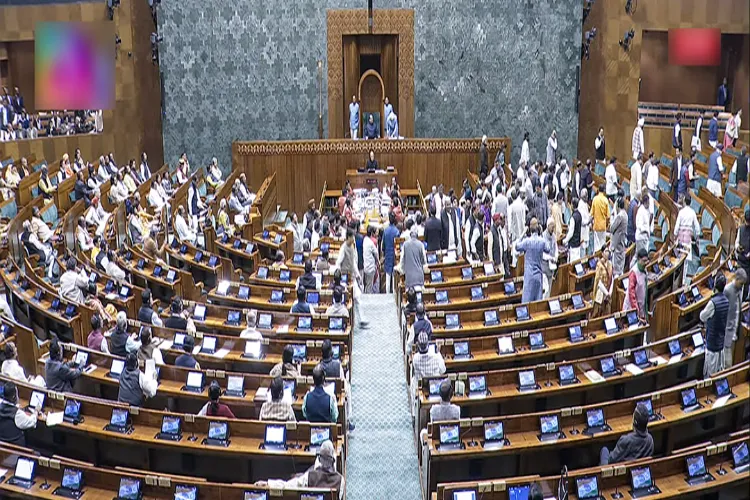
New Delhi
The Bharatiya Janata Party (BJP)-led government is set to table the controversial Waqf (Amendment) Bill, 2024, in the Lok Sabha on Wednesday, with Union Minister for Parliamentary Affairs and Minority Affairs, Kiren Rijiju, confirming the bill’s introduction following the Question Hour. The bill is slated for consideration and passing, accompanied by an eight-hour discussion. He had earlier presented the bill to BJP spokespersons, emphasising its potential benefits for the Muslim community and its role in reforming Waqf management through increased transparency and digitisation.
Rijiju strongly asserted that the bill does not infringe upon religious freedoms, and instead aims to empower those who were previously disadvantaged. "This bill is not a threat to any religious institution, but rather an effort to ensure that those who have been deprived of rights in the past are now empowered," he stated.
However, the bill has drawn strong criticism from the Opposition, which has dubbed it unconstitutional and accused the BJP government of attempting to seize control of Muslim community assets.
AIMIM chief Asaduddin Owaisi called the bill a "grave violation" of fundamental rights enshrined in Articles 14, 25, 26 and 29 of the Indian Constitution. He further labelled it as a “Waqf Barbaad Bill”, urging NDA allies such as Nitish Kumar, Chandrababu Naidu, Chirag Paswan and Jayant Chaudhary to explain their support for the bill.
Samajwadi Party (SP) leader Akhilesh Yadav also voiced his opposition, accusing the BJP of trying to assert control over everything. “We are against the Waqf Board Bill because the BJP wants to interfere in every aspect of governance,” he stated, criticising the government’s approach.
The amendment aims to address long-standing issues in the administration and management of Waqf properties in India, improving efficiency, reducing corruption and preventing encroachments. Among its proposed reforms are enhanced audits, legal mechanisms to reclaim illegally occupied properties and a stronger role for technology in the management of Waqf records. The bill also seeks to rename the existing Waqf Act of 1995 and update various definitions, including that of “waqf”.
The bill’s introduction follows a turbulent parliamentary atmosphere, where opposition members, particularly from Congress, staged a walkout during a Business Advisory Committee (BAC) meeting. Gaurav Gogoi, Congress MP and Deputy Leader of Opposition in the Lok Sabha, accused the government of stifling democratic discourse. "The entire nation is watching how the voice of democracy is being crushed in the Lok Sabha," he said, as Opposition MPs walked out of the meeting to protest the government’s refusal to listen to their concerns.
The Opposition has demanded that discussions on critical issues — such as the Waqf Amendment Bill, the resolution of President’s rule in Manipur and the implementation of EPIC cards be prioritised.
However, the government’s refusal to allocate adequate time for these debates has led to mounting discontent. "We have asked for important discussions under rule 193, but our voices are being ignored," Gogoi said, adding that the Opposition had no choice but to stage a walkout as a form of protest.
TMC MP Kalyan Banerjee also expressed dissatisfaction with the government’s handling of parliamentary proceedings, asserting that the Opposition’s concerns were being sidelined. "We had no choice but to walk out. This is a sorry state of affairs," Banerjee lamented, emphasising that the Parliament floor must be accessible to all voices, not just the ruling party’s.
While the Opposition remains steadfast in their opposition to the Waqf Amendment Bill, Rijiju has hit back at critics, calling their claims misleading. "Waqf laws have been in existence for decades. These provisions were already there before independence, and they continue to be constitutional," he countered. He accused certain political leaders of misleading the Muslim community, warning that such misinformation could harm both society and the nation as a whole.
ALSO READ: Why Guru ki Maseet in Punjab has no Muslim worshippers
The Waqf (Amendment) Bill, also known as the Unified Waqf Management, Empowerment, Efficiency and Development (UMEED) Bill, is set to be one of the key pieces of legislation in the ongoing Budget session of Parliament. As debates intensify, the bill’s future remains uncertain, with the opposition determined to challenge it at every step.
With this bill, the government seeks to modernise the management of Waqf properties in India, a task that has long been criticized for its inefficiency and corruption. However, its potential impact on the Muslim community, as well as its perceived unconstitutional elements, will continue to fuel contentious debates in the coming days.
